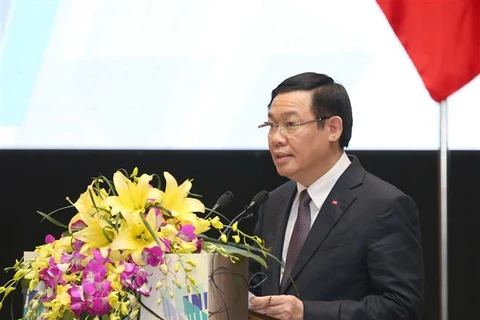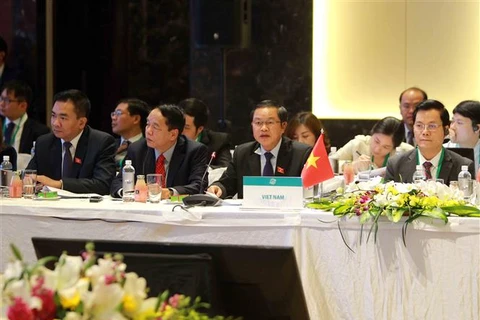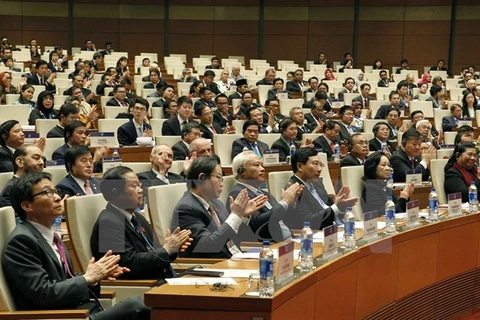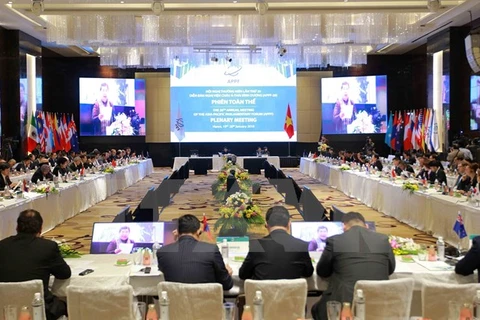 Deputy Prime Minister Vu Duc Dam speaks at the third plenary session, APPF-26 (Source: APPF-27 organiser)
Deputy Prime Minister Vu Duc Dam speaks at the third plenary session, APPF-26 (Source: APPF-27 organiser)Hanoi, (VNA) – The 26th Annual Meeting of the Asia-Pacific Parliamentary Forum (APPF-26) engaged in an important discussion on regional cooperation and development issues during the third plenary session on January 20 morning.
"Climate change, rising sea levels are no longer potential risks, but rather clear and present danger," Vietnam's Deputy Prime Minister Vu Duc Dam opened his keynote address. ‘Right in Hanoi, just last summer, temperatures reached record highs in the past four decades.’
"If the sea level rises 1 metre, roughly 40 percent of the Mekong River Delta will be underwater. Vietnamese current rice production here is at 12 million tonnes per year (export of six million tonnes), roughly 10 – 12 percent of our population will be directly impacted, with a loss of 10 percent of GDP," he went on to say.
The Deputy PM called on every country in the region to develop a legal framework, systems of regulations, policies and priority resources to respond to climate change. "We must make it so that all of society, everyone understands and start from what seems like small and simple acts to tasks that require technology and major resources such as gradual reduction in the use of fossil fuels, development of renewable, clean energy with the aim of developing low carbon economy and fostering green growth," he said.
Speaking of resources for sustainable development, Dam suggested the APPF parliaments to formulate legal systems that clearly specify the rights and responsibilities of organisations, individuals; give priority to resources for implementing Sustainable Development Goals (SDGs); mainstream SDG issues into public expenditure programmes; and strengthen private investments, public private partnerships for SDGs.
The Deputy PM later emphasised the importance of cooperation among parliaments as the legislative bodies have the final say in many pressing issues across nations.
He also lauded the role of the APPF which has proven its relevance in regional issues, promoted reforms to better adapt to changing regional and global developments, continued to build on parliamentary diplomacy to supplement the effective implementation of cooperation programmes with other regional mechanisms, including APEC.
The third plenary session addressed three key dimensions of regional cooperation, namely climate change response, resources for sustainable development, and culture-tourism cooperation.
Representing the Vietnamese delegation, Vice Chairman of the National Assembly Uong Chu Luu proposed the lawmakers promote the APPF role in assisting the implementation of work items under the national programmes on responding to climate change; strengthening the development of policies, international law and monitor law enforcement related to climate change; and reserving priority for the allocation of resources and funding that responds to climate change in economic development and major national investment projects.
Luu also urged the APPF to promote international cooperation in disaster preparedness and increase dialogue, information and experience sharing in promoting the implementation of the Paris Agreement in the Asia-Pacific.
Senator Loren B. Legarda, Chairperson of the Philippines’ Senate Committee on Foreign Relations and Senate Committee on Climate Change, urged parliaments to ensure policies issued along with proper budgets and inspections so that they would be effective in alleviating climate change impacts in line with the Paris Agreement.
She suggests the region work to turn itself from an area vulnerable to climate change into a self-reliant against natural disasters via scientific research, and cooperation in finance, technology transfer, experience sharing, and capacity building.
She said the Asia-Pacific should build a common legal framework on climate change to strengthen regional commitments in the arena.
Stephen Patrick John, Member of Australia’s Parliament, said the Australian Government supports the APEC 2017 declaration on sustainable development and the promotion of public awareness on tourism role in boosting growth.
Noting that most of the five biggest markets of Australia’s tourism sector are located in Asia-Pacific, he said the country backs the opening of directs air routes, and developing tourism infrastructure.
He stressed the importance of having measures to protect future tourism sites and specific mechanisms for tourism management.
The final plenary session on the future of the APPF will take place in the afternoon.
Founded in Tokyo, Japan in 1993, the 27-member APPF is a mechanism that enables parliamentarians to discuss issues of common concern, and to deepen their understanding of the region and the interests and experience of its diverse members. The forum’s proceedings address political, security, economic, social and cultural issues, thus furthering regional cooperation and building relations between and among parliamentarians from the Asia-Pacific region.-VNA
VNA
























